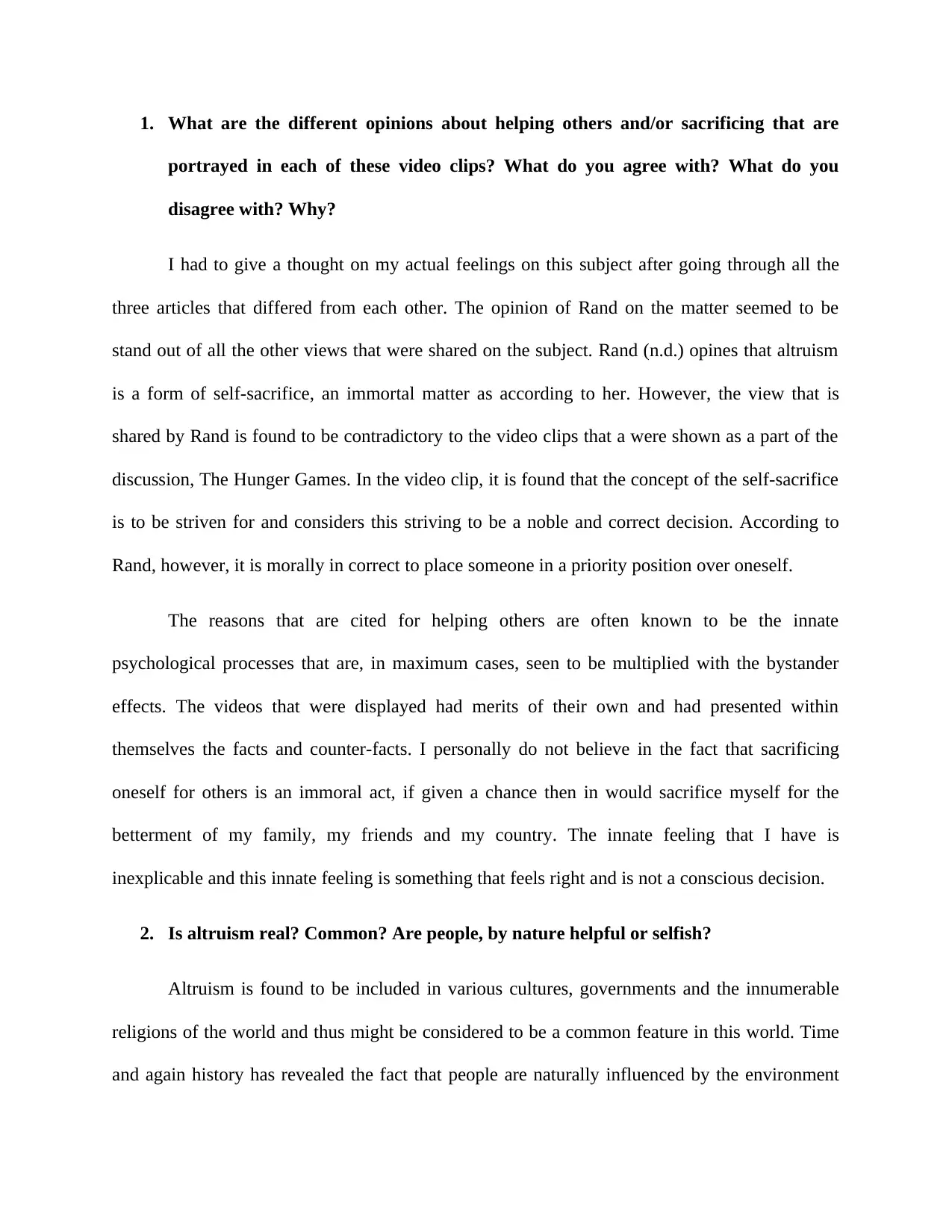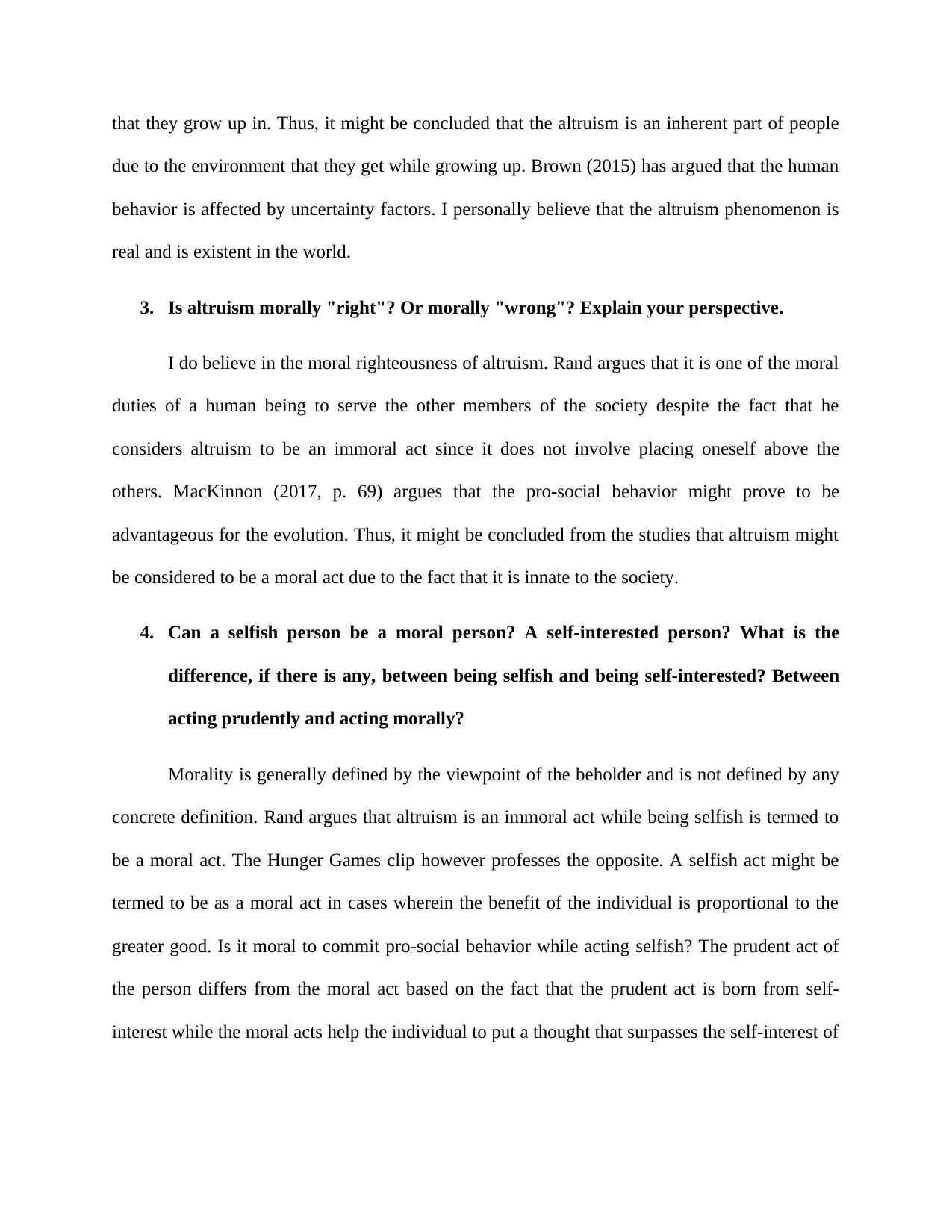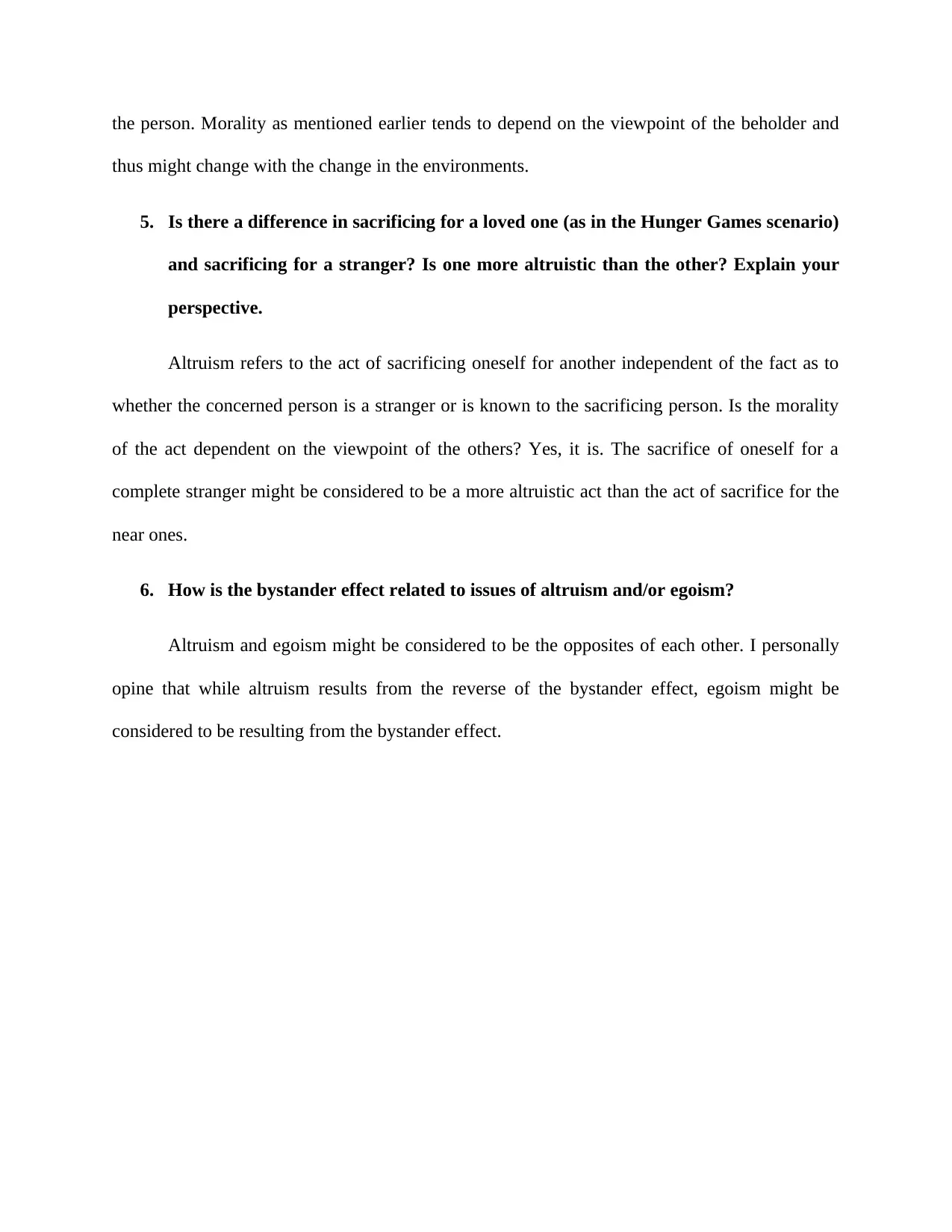A Philosophical Analysis: Altruism, Egoism, and Moral Implications
VerifiedAdded on 2023/06/13
|4
|1011
|409
Discussion Board Post
AI Summary
This discussion post delves into the philosophical concepts of altruism and egoism, examining different viewpoints on helping others and self-sacrifice as portrayed in various video clips, including The Hunger Games. It explores whether altruism is real, common, and morally right, contrasting it with egoism and self-interest. The discussion analyzes the differences between sacrificing for loved ones versus strangers and the relationship between the bystander effect and these concepts. The author reflects on personal beliefs, agreeing with sacrificing for family, friends, and country, and argues that altruism can be a moral act that benefits society, while also acknowledging the complexities and varying perspectives on morality and selfishness. Desklib offers a platform for students to access similar solved assignments and study resources.

1. What are the different opinions about helping others and/or sacrificing that are
portrayed in each of these video clips? What do you agree with? What do you
disagree with? Why?
I had to give a thought on my actual feelings on this subject after going through all the
three articles that differed from each other. The opinion of Rand on the matter seemed to be
stand out of all the other views that were shared on the subject. Rand (n.d.) opines that altruism
is a form of self-sacrifice, an immortal matter as according to her. However, the view that is
shared by Rand is found to be contradictory to the video clips that a were shown as a part of the
discussion, The Hunger Games. In the video clip, it is found that the concept of the self-sacrifice
is to be striven for and considers this striving to be a noble and correct decision. According to
Rand, however, it is morally in correct to place someone in a priority position over oneself.
The reasons that are cited for helping others are often known to be the innate
psychological processes that are, in maximum cases, seen to be multiplied with the bystander
effects. The videos that were displayed had merits of their own and had presented within
themselves the facts and counter-facts. I personally do not believe in the fact that sacrificing
oneself for others is an immoral act, if given a chance then in would sacrifice myself for the
betterment of my family, my friends and my country. The innate feeling that I have is
inexplicable and this innate feeling is something that feels right and is not a conscious decision.
2. Is altruism real? Common? Are people, by nature helpful or selfish?
Altruism is found to be included in various cultures, governments and the innumerable
religions of the world and thus might be considered to be a common feature in this world. Time
and again history has revealed the fact that people are naturally influenced by the environment
portrayed in each of these video clips? What do you agree with? What do you
disagree with? Why?
I had to give a thought on my actual feelings on this subject after going through all the
three articles that differed from each other. The opinion of Rand on the matter seemed to be
stand out of all the other views that were shared on the subject. Rand (n.d.) opines that altruism
is a form of self-sacrifice, an immortal matter as according to her. However, the view that is
shared by Rand is found to be contradictory to the video clips that a were shown as a part of the
discussion, The Hunger Games. In the video clip, it is found that the concept of the self-sacrifice
is to be striven for and considers this striving to be a noble and correct decision. According to
Rand, however, it is morally in correct to place someone in a priority position over oneself.
The reasons that are cited for helping others are often known to be the innate
psychological processes that are, in maximum cases, seen to be multiplied with the bystander
effects. The videos that were displayed had merits of their own and had presented within
themselves the facts and counter-facts. I personally do not believe in the fact that sacrificing
oneself for others is an immoral act, if given a chance then in would sacrifice myself for the
betterment of my family, my friends and my country. The innate feeling that I have is
inexplicable and this innate feeling is something that feels right and is not a conscious decision.
2. Is altruism real? Common? Are people, by nature helpful or selfish?
Altruism is found to be included in various cultures, governments and the innumerable
religions of the world and thus might be considered to be a common feature in this world. Time
and again history has revealed the fact that people are naturally influenced by the environment
Paraphrase This Document
Need a fresh take? Get an instant paraphrase of this document with our AI Paraphraser

that they grow up in. Thus, it might be concluded that the altruism is an inherent part of people
due to the environment that they get while growing up. Brown (2015) has argued that the human
behavior is affected by uncertainty factors. I personally believe that the altruism phenomenon is
real and is existent in the world.
3. Is altruism morally "right"? Or morally "wrong"? Explain your perspective.
I do believe in the moral righteousness of altruism. Rand argues that it is one of the moral
duties of a human being to serve the other members of the society despite the fact that he
considers altruism to be an immoral act since it does not involve placing oneself above the
others. MacKinnon (2017, p. 69) argues that the pro-social behavior might prove to be
advantageous for the evolution. Thus, it might be concluded from the studies that altruism might
be considered to be a moral act due to the fact that it is innate to the society.
4. Can a selfish person be a moral person? A self-interested person? What is the
difference, if there is any, between being selfish and being self-interested? Between
acting prudently and acting morally?
Morality is generally defined by the viewpoint of the beholder and is not defined by any
concrete definition. Rand argues that altruism is an immoral act while being selfish is termed to
be a moral act. The Hunger Games clip however professes the opposite. A selfish act might be
termed to be as a moral act in cases wherein the benefit of the individual is proportional to the
greater good. Is it moral to commit pro-social behavior while acting selfish? The prudent act of
the person differs from the moral act based on the fact that the prudent act is born from self-
interest while the moral acts help the individual to put a thought that surpasses the self-interest of
due to the environment that they get while growing up. Brown (2015) has argued that the human
behavior is affected by uncertainty factors. I personally believe that the altruism phenomenon is
real and is existent in the world.
3. Is altruism morally "right"? Or morally "wrong"? Explain your perspective.
I do believe in the moral righteousness of altruism. Rand argues that it is one of the moral
duties of a human being to serve the other members of the society despite the fact that he
considers altruism to be an immoral act since it does not involve placing oneself above the
others. MacKinnon (2017, p. 69) argues that the pro-social behavior might prove to be
advantageous for the evolution. Thus, it might be concluded from the studies that altruism might
be considered to be a moral act due to the fact that it is innate to the society.
4. Can a selfish person be a moral person? A self-interested person? What is the
difference, if there is any, between being selfish and being self-interested? Between
acting prudently and acting morally?
Morality is generally defined by the viewpoint of the beholder and is not defined by any
concrete definition. Rand argues that altruism is an immoral act while being selfish is termed to
be a moral act. The Hunger Games clip however professes the opposite. A selfish act might be
termed to be as a moral act in cases wherein the benefit of the individual is proportional to the
greater good. Is it moral to commit pro-social behavior while acting selfish? The prudent act of
the person differs from the moral act based on the fact that the prudent act is born from self-
interest while the moral acts help the individual to put a thought that surpasses the self-interest of

the person. Morality as mentioned earlier tends to depend on the viewpoint of the beholder and
thus might change with the change in the environments.
5. Is there a difference in sacrificing for a loved one (as in the Hunger Games scenario)
and sacrificing for a stranger? Is one more altruistic than the other? Explain your
perspective.
Altruism refers to the act of sacrificing oneself for another independent of the fact as to
whether the concerned person is a stranger or is known to the sacrificing person. Is the morality
of the act dependent on the viewpoint of the others? Yes, it is. The sacrifice of oneself for a
complete stranger might be considered to be a more altruistic act than the act of sacrifice for the
near ones.
6. How is the bystander effect related to issues of altruism and/or egoism?
Altruism and egoism might be considered to be the opposites of each other. I personally
opine that while altruism results from the reverse of the bystander effect, egoism might be
considered to be resulting from the bystander effect.
thus might change with the change in the environments.
5. Is there a difference in sacrificing for a loved one (as in the Hunger Games scenario)
and sacrificing for a stranger? Is one more altruistic than the other? Explain your
perspective.
Altruism refers to the act of sacrificing oneself for another independent of the fact as to
whether the concerned person is a stranger or is known to the sacrificing person. Is the morality
of the act dependent on the viewpoint of the others? Yes, it is. The sacrifice of oneself for a
complete stranger might be considered to be a more altruistic act than the act of sacrifice for the
near ones.
6. How is the bystander effect related to issues of altruism and/or egoism?
Altruism and egoism might be considered to be the opposites of each other. I personally
opine that while altruism results from the reverse of the bystander effect, egoism might be
considered to be resulting from the bystander effect.
⊘ This is a preview!⊘
Do you want full access?
Subscribe today to unlock all pages.

Trusted by 1+ million students worldwide

Reference List
Ayn Rand - The Morality of Altruism. (2009, October 26). Retrieved from
https://www.youtube.com/watch?v=51pMod2Aaso&feature=youtu.be
The bystander effect is complicated -- here's why | Ken Brown | TEDxUIowa. (2015, July 12).
Retrieved from https://www.youtube.com/watch?v=Ufs8cKyzLvg&feature=youtu.be
The Hunger Games: Katniss and Peeta Reaping Scene [HD]. (2013, December 3). Retrieved
from https://www.youtube.com/watch?v=e3PJ3Du_zDc&feature=youtu.be
Ayn Rand - The Morality of Altruism. (2009, October 26). Retrieved from
https://www.youtube.com/watch?v=51pMod2Aaso&feature=youtu.be
The bystander effect is complicated -- here's why | Ken Brown | TEDxUIowa. (2015, July 12).
Retrieved from https://www.youtube.com/watch?v=Ufs8cKyzLvg&feature=youtu.be
The Hunger Games: Katniss and Peeta Reaping Scene [HD]. (2013, December 3). Retrieved
from https://www.youtube.com/watch?v=e3PJ3Du_zDc&feature=youtu.be
1 out of 4
Related Documents
Your All-in-One AI-Powered Toolkit for Academic Success.
+13062052269
info@desklib.com
Available 24*7 on WhatsApp / Email
![[object Object]](/_next/static/media/star-bottom.7253800d.svg)
Unlock your academic potential
Copyright © 2020–2025 A2Z Services. All Rights Reserved. Developed and managed by ZUCOL.





